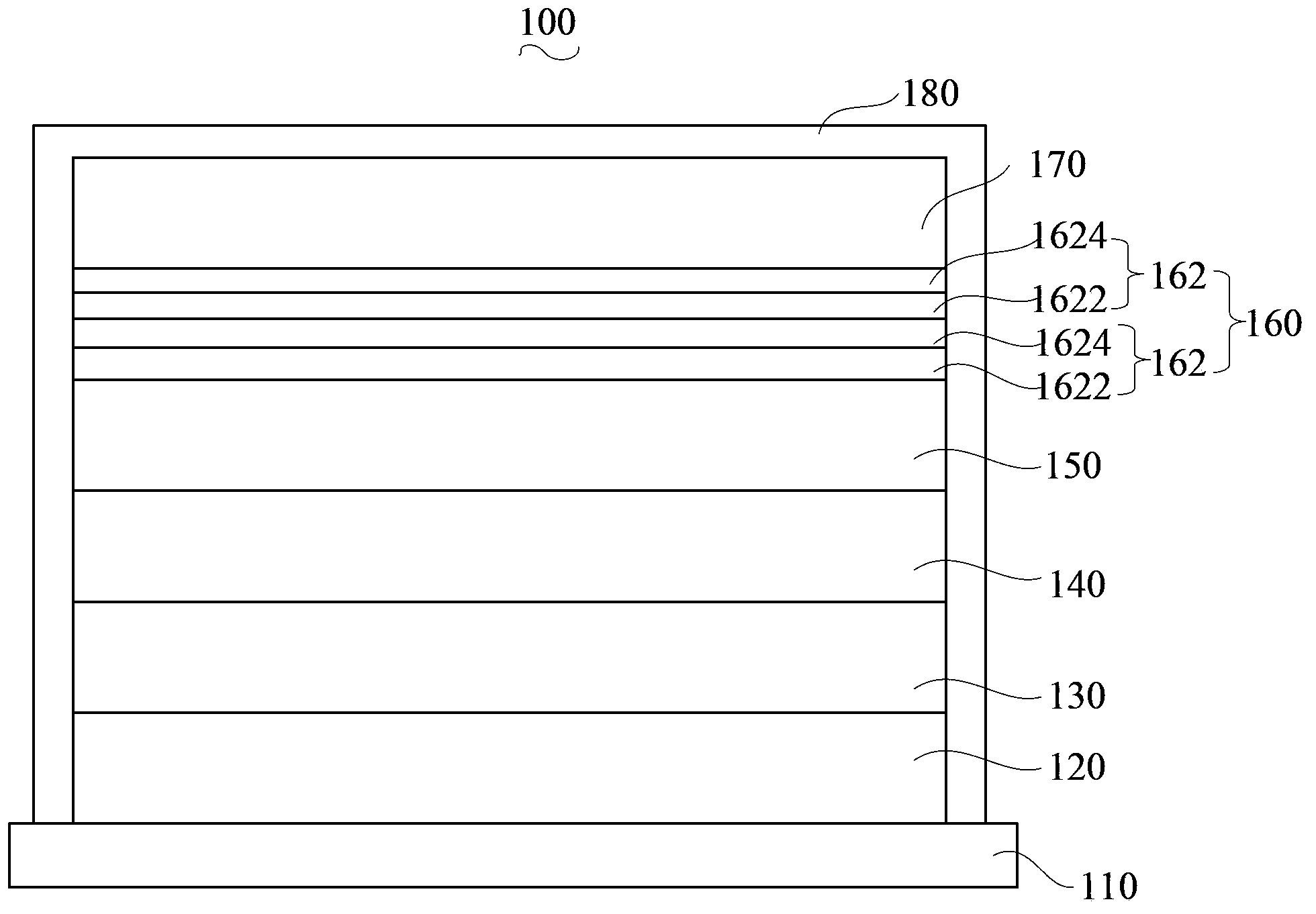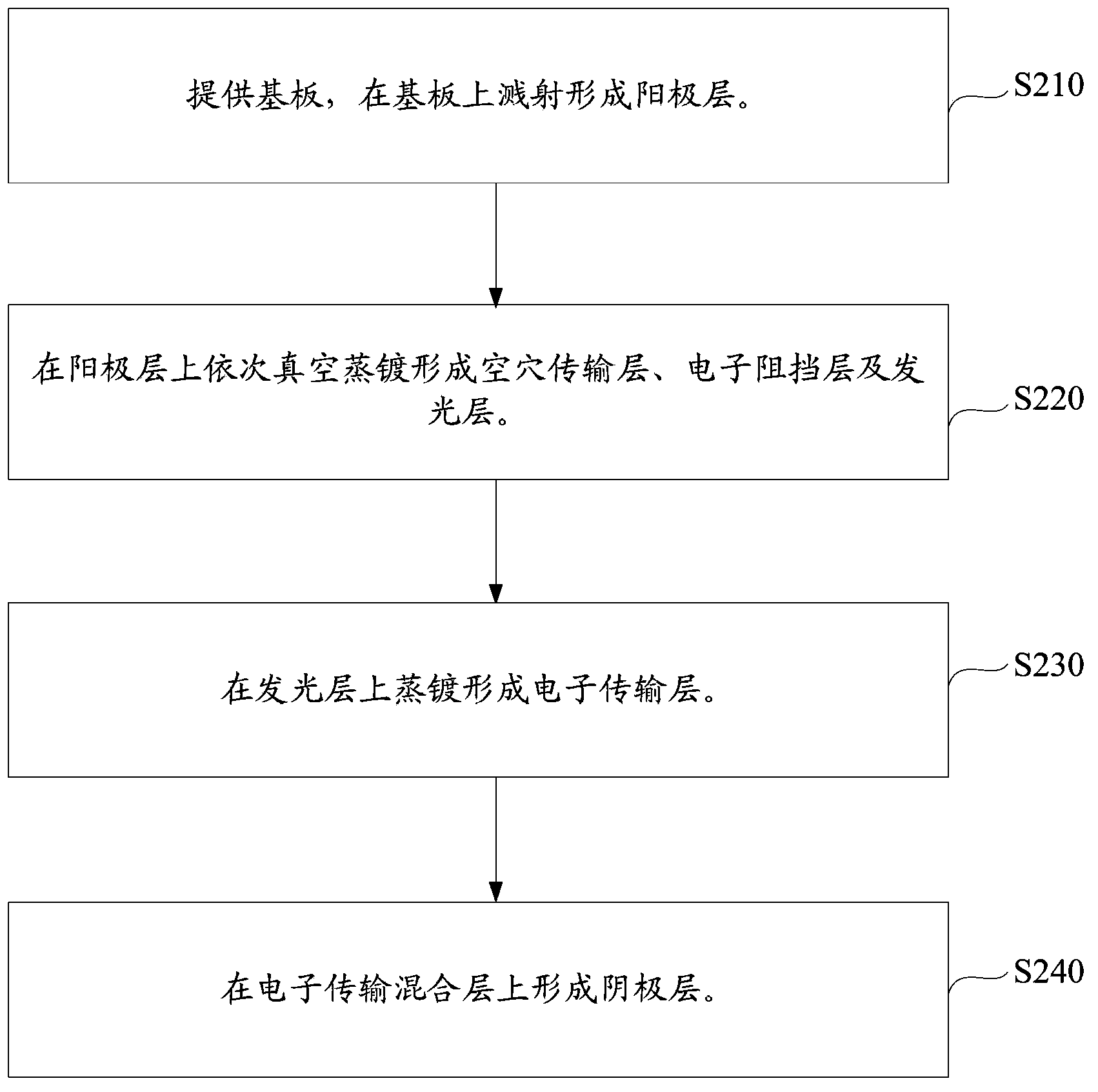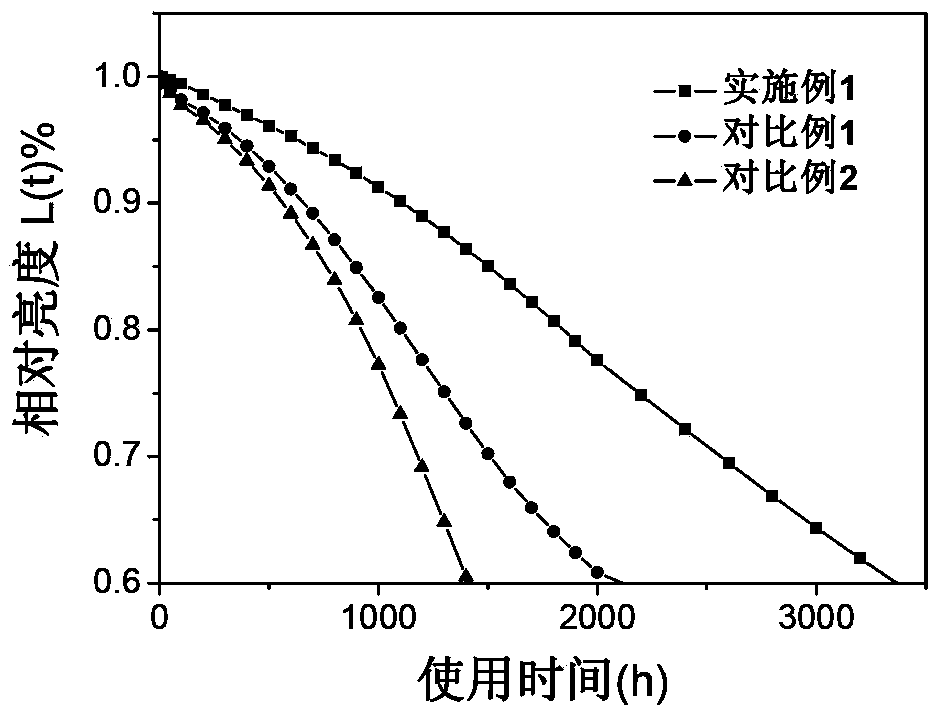Organic light-emitting device and preparation method thereof
An electroluminescent device and luminescence technology, which is applied in the direction of electric solid-state devices, semiconductor/solid-state device manufacturing, electrical components, etc., can solve the problems of high calorific value, affecting the light efficiency and life of the device, long diffusion distance, etc., and achieve improved Luminous efficiency, improved service life, good thermal stability
- Summary
- Abstract
- Description
- Claims
- Application Information
AI Technical Summary
Problems solved by technology
Method used
Image
Examples
preparation example Construction
[0053] Such as figure 2 Shown, the preparation method of the organic electroluminescent device of one embodiment, comprises the following steps:
[0054] Step S210: providing a substrate, and forming an anode layer on the substrate by sputtering.
[0055] Preferably, the sputtering method is magnetron sputtering.
[0056] Preferably, before forming the anode layer by sputtering on the substrate, a cleaning step of the substrate is also included: the substrate is placed in deionized water containing detergent, isopropanol and acetone for ultrasonic cleaning, and then dried. In a specific embodiment, the substrate is placed in isopropanol and acetone and cleaned by ultrasonic waves for 20 minutes respectively; the cleaned substrate is dried by nitrogen gas.
[0057] Step S220: sequentially vacuum-evaporating a hole transport layer, an electron blocking layer, and a light emitting layer on the anode layer.
[0058] Preferably, the vacuum degree during vacuum evaporation is 10...
Embodiment 1
[0067] The structure of the organic electroluminescent device of the present embodiment is: glass / ITO / F6-TNAP:MeO-TPD / TAPC / Ir(ppy) 3 :TCTA / BAlq / CsN 3 :Bphen / BAlq / CsN 3 :Bphen / Ag.
[0068] The preparation of the organic electroluminescent device of this embodiment is as follows:
[0069] (1) Form the ITO anode layer by sputtering on the glass substrate: place the glass substrate in deionized water containing detergent for ultrasonic cleaning. blow dry. Then, an ITO anode layer is formed on the glass surface by magnetron sputtering, and the thickness of the anode layer is 100 nanometers. The glass substrate formed with the ITO anode layer is placed in a plasma treatment chamber for plasma treatment.
[0070] (2) Vacuum evaporation on the ITO anode layer to form a hole transport layer, an electron blocking layer and a light-emitting layer in sequence: the vacuum degree is 5×10 -4 Pa, where the material of the hole transport layer is 1,3,4,5,7,8-hexafluoro-tetracyano-dimethy...
Embodiment 2
[0075] The structure of the organic electroluminescent device of this embodiment is: glass / ITO / MoO 3 :2-TNATA / TAPC / Ir(MDQ) 2 (acac):NPB / Gaq 3 / LiN 3 :TPBi / Gaq 3 / LiN 3 :TPBi / Ag.
[0076] The preparation of the organic electroluminescent device of this embodiment is as follows:
[0077] (1) Form the ITO anode layer by sputtering on the glass substrate: place the glass substrate in deionized water containing detergent for ultrasonic cleaning. blow dry. Then, an ITO anode layer is formed on the glass surface by magnetron sputtering, and the thickness of the anode layer is 100 nanometers. The glass substrate formed with the ITO anode layer is placed in a plasma treatment chamber for plasma treatment.
[0078] (2) Vacuum evaporation on the ITO anode layer to form a hole transport layer, an electron blocking layer and a light-emitting layer in sequence: the vacuum degree is 1×10 -3 Pa, where the material of the hole transport layer is molybdenum oxide (MoO 3 ) doped 4,4′,4...
PUM
 Login to View More
Login to View More Abstract
Description
Claims
Application Information
 Login to View More
Login to View More - R&D
- Intellectual Property
- Life Sciences
- Materials
- Tech Scout
- Unparalleled Data Quality
- Higher Quality Content
- 60% Fewer Hallucinations
Browse by: Latest US Patents, China's latest patents, Technical Efficacy Thesaurus, Application Domain, Technology Topic, Popular Technical Reports.
© 2025 PatSnap. All rights reserved.Legal|Privacy policy|Modern Slavery Act Transparency Statement|Sitemap|About US| Contact US: help@patsnap.com



